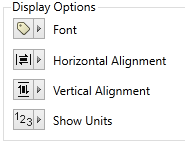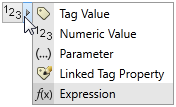Advanced Formatting: Options for Properties
Many property dialogs offer a range of options for supplying the value to any given property. Use these to make a property change dynamically in response to changing conditions in the application.

Four of the many ways to supply a value to a property
The default symbol indicates the kind of value that the property can hold, whether that is a link to a tag, a number, a color, etc.
As shown in the following image, you can click on the arrow to be presented with a range of options for how to supply a property value in a way other than direct (and static) configuration in the properties dialog.

Typical options to supply a value to a parameter
Options may vary by value type. The first is always the default.
Options
Tag Value
Select a tag whose value type matches that needed by the property.
Numeric Value
Provide a constant value to be used by the property.
Parameter
Pages and user-defined widgets (both standard and tag widgets) can have parameters. If this object is within one of those, you can select a parameter from the page or widget to pass its value to this object parameter.
Linked Tag Property
Applies if the object is within a user-defined Tag Widget. The value for the parameter can be supplied by a property of the correct value type within the linked tag.
Expression or Text Expression
Write a steady-state expression to supply the value to the parameter.
Value Ranges
Most parameters will have a range of accepted values. For example, color is typically provided as text in the form "<AARRGGBB>" (Alpha - Red - Green - Blue, supplied as hexadecimal values). Color parameters will also accept a numeric value from 0 to 255 corresponding to the VTScada color palette.
If the parameter is a selection such as Alignment (left, right, center), On/Off, True/False, etc. the range of possible numeric values is restricted to those matching the selection, starting at 0. The order is typically shown in the default values:

